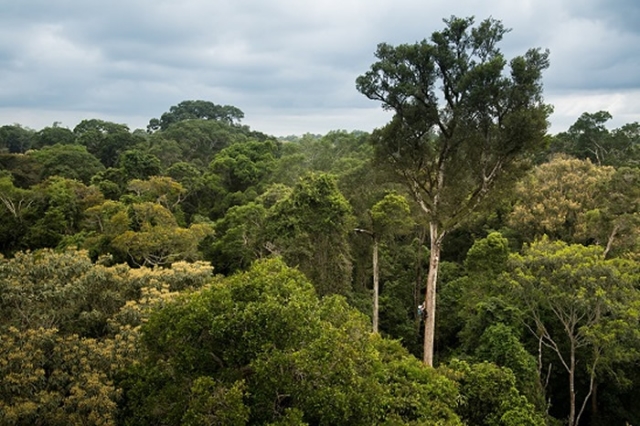Tropenbos Ghana charges stakeholders to address overdependence on forest resources
Tropenbos Ghana, an NGO that influences forest policy and sustainable development, has called on stakeholders to take a critical look at deforestation.
The organisation made the call on Monday, March 21, as it joined millions worldwide to celebrate International Day of Forests.
The day is set aside to celebrate and raise awareness on the importance of all types of forests and trees around the world,
and their contribution to the wellbeing of all.
The global theme for this year’s celebration is: “Forests and Sustainable Production and Consumption”.
To mark the day, Tropenbos Ghana, in a statement, noted how the world was losing forests and trees at an alarming rate.
According to them, this current trend poses major threats to livelihoods, especially in developing countries, as well as production/supply and consumption chains that largely depend on forests resources.
In view of the above, the company reiterated the importance and interdependence between local communities and forests and the need to minimise actions destructive to forests and tree resources.
Forest Values, Threats, and Recommendations
The statement noted that forest ecosystems, by their nature and form, provide critical ecosystem services — they are home to about 80% of the world’s terrestrial biodiversity with more than 60,000 tree species, improve soil fertility through nutrient fixing and climate rationing.
It said specifically in Ghana, forests and trees are of numerous value, including the provision of timber and non-timber products, for both businesses and households.
It, therefore, wondered why deforestation in Ghana continues at an alarming rate, despite all the priceless ecological, economic, social and health benefits.
With this year’s theme in mind, Tropenbos Ghana, therefore, called on all stakeholders to take immediate steps to balance the country’s need for essential forest services with the extent of damage caused by the dependence on forest resources.
They believe doing this will secure forests and the services derived from them.
Tropenbos Ghana, therefore, recommends that in cocoa-forest landscapes;
- Ghana COCOBOD and Licensed Cocoa Buying Companies speed up processes for production, trade and consumption of legal and sustainable cocoa only.
Evidence shows that a ready market for unsustainable/illegally produced cocoa serve as the motivation for sustained and further encroachment into forest lands for cocoa production.
Sourcing cocoa from sustainable and legal sources will only serve as a disincentive for encroaching on forests lands for cocoa production.
This however should be complemented by addressing other factors, including illegal logging, bushfires, illegal mining, among other things that threatens forest and associated resources.
- Local and International Chocolate Producers and Consumers should pay more for Sustainably Produced Cocoa
Admittedly, sustainable cocoa production practices including intensification and climate-smart practices are relatively expensive compared to conventional practices.
To incentivise and sustain farmers’ interest in sustainable cocoa practices, companies must invest in sustainable practices including the provision of technical and financial support to enhance farmer and farm wellbeing.
- Generally, stakeholders should adopt Integrated/Landscape Approach to minimise the incidence of Wildfires in Forested Areas
Over the past half-century, wildfires have ravaged major forest reserves in Ghana, and in some cases, it has become a norm. This is mainly due to a lack of responsibility among institutions, and limited scale approaches to wildfire management.
Stakeholders including the Forestry Commission, Ghana National Fire Service, Ministry of Food and Agriculture, Ghana Police Service, Traditional Authorities, Municipal & District Assembles, Communities and Private should inclusively and collaboratively design and adopt effective and efficient wildfire management approaches.
Such an approach should look beyond boundaries and sectors with a clearly defined institutional mandate, roles, and collaborative responsibilities.
- Sanctions Regime for Forest Offences should be more Deterrent, and Enforceable
Sanctions for forest-related offences including illegal logging, encroachment for farming, poaching, should be reformed to make them more punitive and enforceable.
Such punitive sanctions should come with enhanced institutional capacity (Forestry Commission, Ghana Police Service, and others) for effective enforcement and/or compliance.
- Reform Tree Tenure to Secure Farmers Ownership, Benefits and Interest in Tree Resources
Farmers have a crucial role and responsivity over tree management in off-reserve areas, yet they
benefit less from nurtured trees. The status quo, that is, naturally occurring trees vested in the
state, must be reformed with improved farmers’ ownership and benefits.
This will rekindle farmers’ interest in improving tree cover including both planted and naturally occurring.
Moreover, the Forestry Commission and relevant stakeholders should fast-track processes for registration of planted trees to secure farmers’ ownership and interest in tree resources.
- Enhanced Awareness Creation on Sustainable Forest Practices
Most people are aware of the importance of forests but have limited options to reduce or curb actions that threaten the integrity of forests and tree resources.
It is imperative for the Forestry Commission, CSOs, Traditional Authorities and CBOs to continuously raise awareness on sustainable forest resource use and management as a collective responsibility.
About Tropenbos Ghana

Tropenbos Ghana was established in 2001 in response to sustainable landscape management challenges in Ghana.
In 2017, Tropenbos Ghana became a legal national entity and a member of the Tropenbos International network.
Their mission is to generate, communicate and advocate the application of information that optimises forest benefits through participatory and collaborative approaches.
Their goal is to ensure that forest sector actors in Ghana apply sound and adequate information for poverty reduction policies, implement activities that increase forest cover, promote climate-resilient practices, reduce conflicts associated with forest management and ecosystem services.
They are into research, capacity building (individuals, communities, institutions, and relevant stakeholders), provision of platforms for informed dialogues on topical forestry issues and sharing of lessons and experiences at local, national, and international levels.



